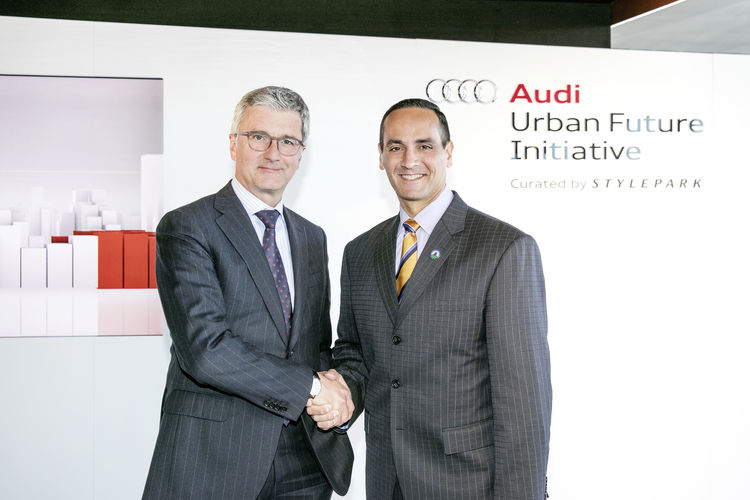Audi brings automated parking to the Boston area

Audi and the city of Somerville are planning joint innovations for the city of the future on the east coast of the USA.
Audi CEO Rupert Stadler and Mayor Joseph A. Curtatone signed a Memorandum of Understanding in the context of the Smart City Expo World Congress in Barcelona. They agreed to develop an urban strategy for Somerville, applying technologies for swarm intelligence or automated parking, and networking cars with traffic lights.
In the Memorandum of Understanding, Mayor Josef A. Curtatone and Rupert Stadler, chairman of the executive board of AUDI, agreed close cooperation in developing a new mobility strategy for Somerville. The focus is on exchanging know-how and testing new technologies. In Stadler’s words, “The intelligent car can unfold its enormous potential only in an intelligent city. Our joint work on urban innovations and the exchange and analysis of data are the key to beneficial swarm intelligence.” In the long term, the two sides aim to develop innovations that reduce the space requirement of automobiles in the city and increase the speed of traffic flow.
“The car will always be part of our mobility. At the same time, due to congestion and parking problems, today it shows us the limits to mobility. With technologies from Audi we expect to be able to use the available urban space more efficiently. This enhances the quality of urban life,” says Curtatone.
Thanks to its central location in the Boston metropolitan area, Somerville is a role model for “smart cities.” After Silicon Valley this region has the fastest-growing economy in North America. In the coming years, Union Square in Somerville will be transformed into a flourishing city center. By means of urban redevolopment, new dwellings, offices and commercial real estate will be built. More people on the same surface area also means, however, that the existing mobility infrastructure reaches its limits. Therefore Audi is supporting the project at Union Square with innovations such as the traffic-light assistant. This will help traffic to flow faster.
In addition to networked infrastructure, Audi is bringing automated parking to the project. Self-parking cars result in three different benefits. Parking garages can be relocated from the city center to less attractive places. At the same time the parking area required per car is reduced by approximately two square meters. The cars park closer together and need fewer, much narrower lanes in garages, where pedestrian paths, elevators and stairs are no longer required. A parking garage of the same size can then take up to 60 percent more vehicles – sufficient to end curbside parking. Finally, there are fewer cars on the roads searching for a place to park.
Intelligent parking space management in the Assembly Row district (Somerville/USA)
The second project in Somerville can also benefit from automated parking technology. In the Assembly Row neighborhood within the Assembly Square District, the real-estate developer Federal Realty Investment Trust (FRT) has master-planned and is building a mixed-use project just seven minutes from Boston. Residential buildings, a hotel, offices, retail spaces, entertainment, leisure facilities and parking are supported currently by a dedicated high-speed transit station linking the district to the urban core. In the USA, many new urban construction projects strive to mix uses, in order to enhance the user experience and balance market demand, including a fixed number of parking spaces.
“Parking is expensive to build and uses a huge land area,” said Chris Weilminster, executive vice president of real estate and leasing at FRT. In Assembly Row each parking space can cost upwards of 25,000 dollars on average. “Decreasing the amount of parking would allow developers to use that land area for other purposes that benefit the consumer experience while also controlling costs, and driving profitability.” A fleet of self-parking cars would save space and reduce costs, in Assembly Row up to a theoretical amount of 100 million dollars, and could be managed intelligently by means of an exclusive sharing arrangement. “We are excited to continue exploring this innovative technology as an alternative to constructing large and costly parking garages.”






Comments
There are no comments yet for this item
Join the discussion